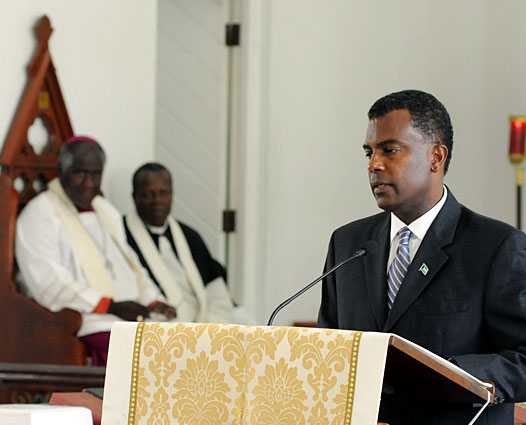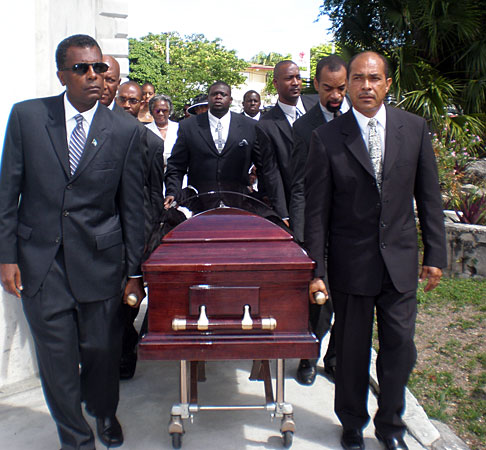 Levi
Gibson was my godfather and the godfather of many, many others, in the
old fashioned sense of that word. Many of his godchildren are here
in the church today. I am honoured to have been chosen to speak.
Levi
Gibson was my godfather and the godfather of many, many others, in the
old fashioned sense of that word. Many of his godchildren are here
in the church today. I am honoured to have been chosen to speak.
 Levi
Gibson was my godfather and the godfather of many, many others, in the
old fashioned sense of that word. Many of his godchildren are here
in the church today. I am honoured to have been chosen to speak.
Levi
Gibson was my godfather and the godfather of many, many others, in the
old fashioned sense of that word. Many of his godchildren are here
in the church today. I am honoured to have been chosen to speak.
In my case, he stood around the font in 1953 with Setella Dillet, as she was then, now Setella Cox and with Roderick Turnquest in St. Agnes Church. He promised on my behalf to renounce the devil and all his works and to bring me back to the Bishop to be confirmed in the faith.
He did all of that and more. To say I will miss him, to say I admire him beyond measure are all understatements to describe what I hope is obvious.
He was my father’s friend. Frederick A. Mitchell
Sr. was an auto mechanic and he used to fix Mr. Gibson’s trucks.
I suppose that is the first memory that I have, the stories
by the old man of Long Island of how Mr. Gibson liked to drive, but
also often fell asleep at the wheel on those long drives on Long Island,
and he would have to wake him up to avoid running off the road. Or
taking me and the Braynen boys out to the Capital theatre in Market Street
for an afternoon movie.
But the adult dimension of this relationship begins with my coming back home, a lawyer. He bought my wig for me. He took me almost literally by the hand and introduced me to Harold Longley, then a Manager at the Royal Bank of Canada and in a moment in the twinkling of an eye, I had my car and some money in my pocket to start my future. The obituary tells you how he felt about the Royal Bank of Canada.
He was a kind man but not one given to ceremony or excess. He was an important and powerful man but not one to boast of, to vaunt himself.
In 1997 and in 2002, he paid the deposits for my election campaigns. He insisted on it and I was sitting in my office in Fox Hill in 1997 when he came to deliver the money himself. He had it in 4 crisp 100 dollar bills. As he handed them to me, he wept; uncontrollably, openly. He said that he could not understand why I wanted to go into politics but if that is what I wanted fine but do not let these people use you. I am afraid they are going to use you.
He had his political beliefs. They were clear and they were not for my side but it never came up and it never stood in the way. The men who ran the country in the dispensation post 1967 understood who he was. They were always respectful and he was always Mr. Gibson to them.
I want to thank my colleagues and then Prime Minister Christie for their support of the advice to Her Majesty the Queen to enlist him as a Member of the British Empire in the honours of 2007.
He was a courtly considerate man. He had a courtly and considerate wife who helped him shape and maintain his image. When she was alive and well, she prepared lunch for him every day. It was packed and sent to the office. Then came the invitation to me and my friend Al Dillette and later Setella and Georgie Cox to join him. We would meet over at his office. Virginia and the housekeeper Thelma would prepare every day lunch to be brought down by Burns: table set, linen tablecloth, linen napkins, fine white wine. A fine dining experience. Most times, it was just the two of us.
You can see then that we talked about a lot of things. The obit that I hope you have read and I hope does justice to his life was written and constructed from a chat I forced him to have on 15th June 1993. He was 79 and I thought at the time, when he goes his story must be told.
Psalm 90 says “we spend our years as a tale that is told”. What a tale was Mr. Gibson’s life. That same psalm says “the days of our lives are three score and ten and if by reason of strength they be four score…” Imagine then to live four score and 14.
His wife Virginia died 17 years ago. They were quite a couple when they arrived on the scene. She was outspoken but he was in charge. An old fashioned kind of guy that way. One day he was talking to a client trying to sort some problem out, and she tried to give her opinion about the matter. He turned to her and said Virginia, why don’t you stay out of my business. She stopped, looked at me, put her hand over mouth and said: “Well! That’ll hold me.” I still laugh about it today. She wanted for nothing in her life. This nurse who graduated at the top of her class in 1937 and nursed the poor and the powerful. The names are like a who’s who. He described her as a great asset.
 We
talked a lot about his death and his funeral. He was a matter of
fact man. Not much for palaver. Like me, he believed in the
Anglican prayer book service.
We
talked a lot about his death and his funeral. He was a matter of
fact man. Not much for palaver. Like me, he believed in the
Anglican prayer book service.
He wanted Archdeacon William Thompson to say few words
over his body and when we would all go home. The Archdeacon tragically
predeceased him but we who are left are doing just a bit more than that.
The point is that he was Anglican through and through. As I thought about it, I recalled some opening lines in the novel ‘A Prayer For Owen Meany’ by John Irving. I paraphrase: “When I die… the Anglican Church will perform the necessary service. My selections from the Order For the Burial of the Dead are entirely conventional and [can] be found, in the order that I shall have them read, not sung in the Book of Common Prayer. Almost everyone I know will be familiar with the passages from John beginning with ‘…whosoever liveth and believeth in me shall never die’. And then there’s ‘in my father’s house are many mansions. If it were not so, I would have told you’. And I have always appreciated that passage from Timothy, the one that goes ‘… we brought nothing into this world, and it is certain we can carry nothing out.’ It will be a by the book Anglican service. I am an Anglican now and I shall die an Anglican.”
I admired and admire the fact that here was a phenotypically black man, man of African descent, who in the worst days of oppression could say “it never affected me in any way.” It is a great story. I know that I am part of the new dispensation but I understand that I could not be here without men like Mr. Gibson and as such, I see myself as a protector of his reputation and his legacy. That is the least I can contribute for all that he did for me personally.
I make no apology for it. This protective instinct became even more acute as his flesh began to fail in his later years. I was furious when unscrupulous journalism for the love of money misused an opportunity of access to him to help to spin an idle tale, about the death of Harry Oakes about which despite all the rumours and theories, Mr. Gibson knew only what we the public already knew. To me it was almost unforgivable.
I hope we have done justice to Mr. Gibson today, that we won’t detain you any longer than he would have wanted to. I express my personal gratitude and that - I am sure - of all Mr. Gibson’s godchildren; to Avis Outten and her family for all that they did for him. To Charles Gibson and his family for their love and support to the end. To Philip, Thelma, Burns and Lynette, to all of you.
In the face of 94 years, I wish to quote Shakespeare’s Hamlet the comment “What a piece of work is man? How noble in reason! how infinite in faculties! in form and moving, how express and admirable! in action how like an angel! in apprehension, how like a god! the beauty of the world! the paragon of animals! And yet, to me, what is this quintessence of dust?”
Levi Gibson was our godfather, in the old fashioned sense of that word, before today’s cynicism set in. But as he used to say, “nothing bothers me Fred!”
In that spirit, I leave you then with the words of William
Butler Yeats, a great inscription written on his tombstone that describes
Mr. Gibson’s view of life:
“Cast a cold eye, on life, on death. Horseman pass by!”